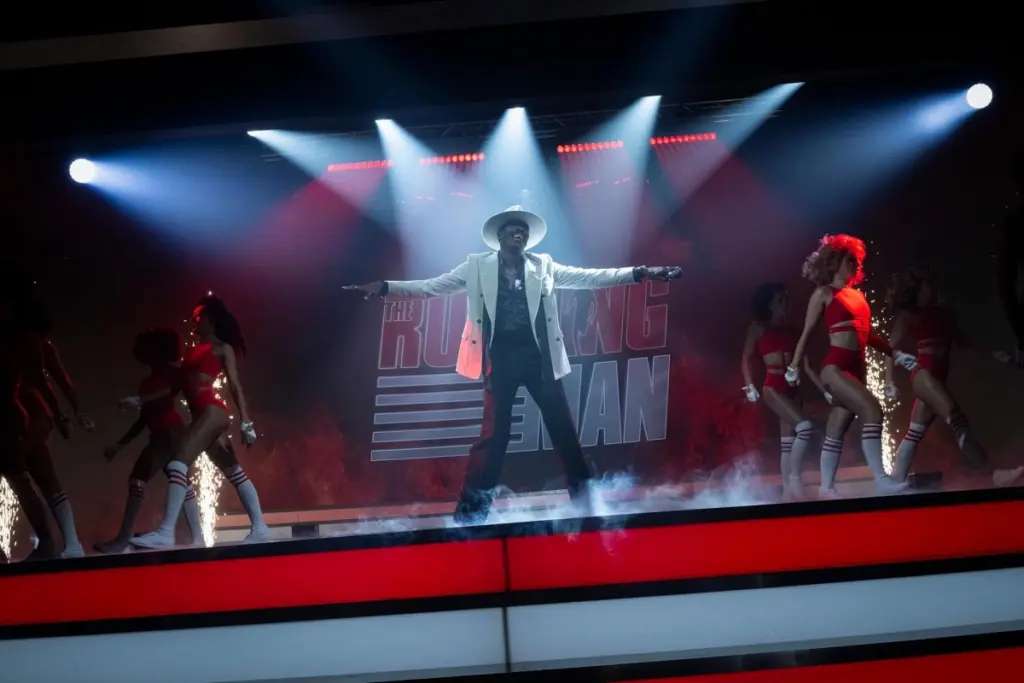‘The Running Man’: Stephen King Adaptation Becomes a Fierce State-of-the-Nation Critique
In many ways, “The Running Man” is an easy film to write off as a bombastic slot-plugger. But while its glib, overcooked style requires you to leave your critical-thinking cap at the door, this is still a movie that packs a surprising punch – not so much for its story (which is fairly old hat) or its characters (who are sketchily written) as for how well its vision of the near future mirrors the most troubling facets of living in 2025’s America.
“The Running Man” – Derivative but Uncommonly Impactful

“The Running Man,” which opened in the United States on November 14, is the second film adaptation of the 1982 novel by Stephen King (published under the pseudonym Richard Bachman), the first film having been released in 1987. It takes place in a future America where a totalitarian regime keeps citizens’ minds diverted from hardship and injustice with “The Running Man” – a bloodthirsty reality game show in which a convict must struggle to survive while being hunted by special state-sponsored assassins. The protagonist, Ben Richards (Glen Powell), is a fundamentally good guy whose concern for the downtrodden gives the audience (both in-universe and out of it) a Running Man worth rooting for.
In contrast to the less tethered scenarios of such similar (and, in terms of pure storytelling, superior) dystopian films as “The Hunger Games” series and this past September’s King/Bachman adaptation “The Long Walk,” “The Running Man” takes place in a near-future United States where deepfakes have become an everyday tool of despotism, militant masked law-enforcement agents apprehend and kill disadvantaged citizens at their government’s unchecked discretion, and freedom of expression is only permitted to those whose rights and perceived humanity have become utterly forfeit. Its broad premise is 43 years old, and its chief aspiration is crowd-pleasing entertainment, but seldom has a sci-fi film so disquietingly evoked the current world beyond the theater.
Technology as Weapon and Sedative
The futurism of “The Running Man” is showy without being outlandish. Nearly all the high-tech advancements that figure into its plot are taken straight from today’s emerging-technologies headlines, and they all have one purpose: to keep citizens under control, one way or another. Air-based DNA detectors are used to swiftly pinpoint the Running Man’s location, while deepfakes ensure that no state-sponsored footage in “The Running Man” can be trusted at face value. “The Running Man” also presents a rather novel cautionary lesson about self-driving cars, satirically depicting automated transport as an additional facet of the affluence-drugged helplessness that characterizes the citizenry’s 1%.
The Hunters: Hackneyed But Never More Relevant
The Hunters – the death squad of five black-clad, masked, armed men intent on killing Ben Richards – are exactly what you’d likely get as the result of an AI prompt for “fascist death squad.” But watching these MPs relentlessly pursuing and abusing their vulnerable, vilified targets, egged on by a jingoistic ad that amusingly merges the traditional white-picket-fence, red-white-and-blue aesthetic with the coarse, aggressive language of a Trump soundbite, is no longer the good old-fashioned dystopian escapism that it might have seemed even six months ago.
The Most Poignant Character: A “Good,” Wealthy Citizen Who Has a Lot to Learn

While Ben Richards has more than his share of supporters and covert helpers among the masses, there is one less likely ally whose moral dilemma makes her searingly resonant. Here there be major spoilers: Following some “Fury Road”-worthy escape stunts, Ben Richards hijacks a self-driving car inhabited by Amelia Williams (Emilia Jones), a civilian whose vehicle, prior to his entry, was its own self-contained universe in which she blissfully enjoyed her beloved (non-“Running Man”) reality shows without ever even having to look at the road along which she was traveling.
Ben’s remark that the scarf she’s wearing must’ve cost the kind of money that would save his sick daughter’s life triggers a crisis of conscience and feeble self-absolution from the moral position that has been known since the Holocaust as the ‘good German’ mentality – a mentality that he’s able to shatter altogether with the revelation that the government’s latest deepfake features her.
As grim as its worldbuilding may be, “The Running Man” nonetheless terminates in a Hollywood ending, in which Amelia plays the most pivotal role. Having become Ben’s ally, she’s the one who salvages the unabridged recordings that galvanize the entire nation against its overlords. Her single, crucial act is a symbolic wakeup call to ‘good Germans’ everywhere: whether one is enjoying one’s own privilege in a near-future economic dystopia or a modern America threatened by powerful fascists, resistance is most easily effected by those with the least to fear (relatively speaking) from their oppressors. Too bad that it’s a lot harder to choose the path of resistance before one has actually been on oppression’s blunt end oneself.





